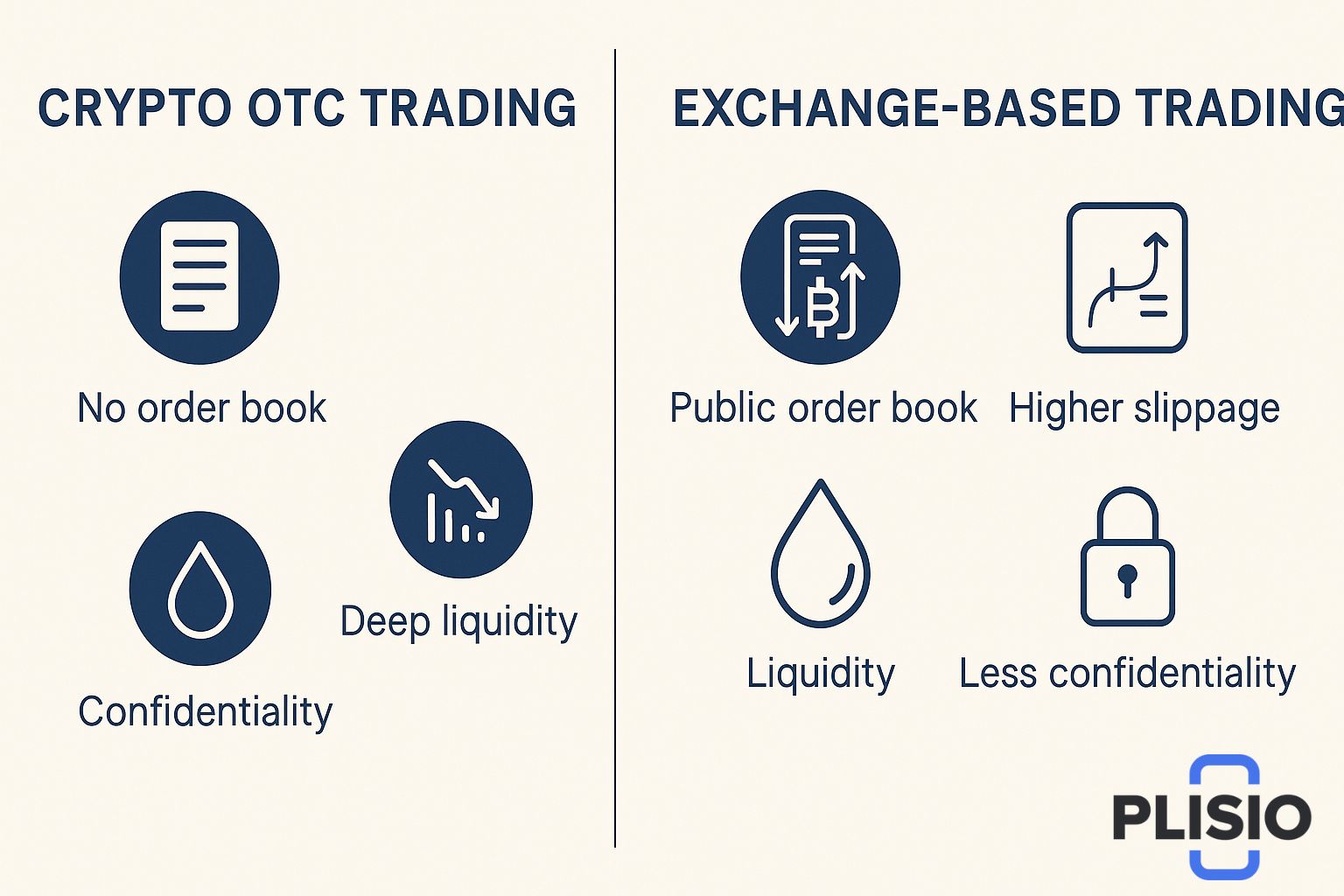Comprehending the Crypto OTC Trading World

Specialized trading services are becoming more and more necessary as the use of cryptocurrencies increases. Over-the-counter, or crypto OTC, trading is one such service that offers a discreet and effective way to trade large amounts of crypto assets outside of conventional crypto exchanges. This article explores the intricacies of cryptocurrency over-the-counter trading, including its advantages, disadvantages, and the reasons institutional investors and high-net-worth individuals are becoming more and more interested in it.
What is OTC Crypto?
The direct exchange of cryptocurrencies between buyers and sellers without the use of public exchanges or order books is known as "crypto OTC." OTC trades happen directly between two parties, frequently via a trustworthy OTC desk or cryptocurrency OTC trading platform, in contrast to traditional exchange-based trading, which is visible and has the power to affect market prices. This strategy works especially well for carrying out big transactions without having a big effect on the market or causing slippage.
Because they serve as middlemen, cryptocurrency OTC desks allow high-volume traders to complete transactions quickly and covertly. For organizations that handle sensitive data or have high volume requirements, this diminished market impact is a big lure.
OTC Trading: Why?
Because of additional trading fees, limited liquidity, and market volatility, using traditional exchanges when clients buy and sell large quantities of digital assets can be inefficient and expensive. OTC desks provide deep liquidity pools and customized trading services that let high-volume traders and institutional clients trade effectively and confidently.
Clients choose OTC for several main reasons, including:
- Decreased influence on the market
- Having access to deep liquidity
- Adaptable settlement alternatives
- Tailored trade execution
- More privacy
- Individualized trading experience
- OTC Trading's Operation
An OTC desk usually facilitates OTC trading by connecting a buyer and seller and negotiating terms like price, amount, and settlement options. RFQ (Request for Quote) systems are frequently used for this. The desk will carry out the order and supervise settlement after the trade has been approved; this may involve transfers of stablecoins or other supported assets.

Here's how trading operates:
- A client brings a sizable trade request to a desk.
- Using market prices and available liquidity, the desk provides a quote.
- The order is executed and settled according to pre-arranged terms if it is accepted.
Desks serve a diverse clientele, which includes high-net-worth individuals, institutional investors, and hedge funds. Smooth and effective operations are guaranteed by a respectable broker or trading desk.
OTC Desk Skills
|
Feature |
Benefit |
|
Deep Liquidity |
Allows execution of large trades without price disruption |
|
Flexible Settlement |
Includes fiat, stablecoins, or other digital assets |
|
Confidentiality |
Protects trade intent from the public |
|
Minimal Market Impact |
Prevents significant price movement during execution |
|
Personalized Service |
Tailored trading solutions and customized terms |
OTC Crypto Trading Benefits
- Flexibility: Fiat, stablecoins, or other digital asset classes are among the flexible settlement options that OTC desks frequently provide.
- Minimal market impact: There is much less of an impact on the market because OTC trades take place outside of public exchanges.
- Confidentiality: High-net-worth individuals and institutional investors prefer that the trade's specifics stay confidential.
- Customization: To meet the needs of the customer, flexible trading terms are frequently offered.
Actual Use Cases
It is necessary for a hedge fund to make portfolio adjustments without informing the market. To swiftly execute several trades, it makes use of an OTC cryptocurrency trading platform.
A high-net-worth individual is looking for a smooth transaction with flexible settlement when they want to buy or sell a significant amount of Bitcoin.
Rather than exposing positions on public exchanges, an institutional investor seeking volatility hedging would rather use an over-the-counter desk.
Obstacles in Crypto OTC
OTC cryptocurrency trading carries risks and difficulties despite its benefits. Particularly in unregulated markets, counterparty risk is an issue. Furthermore, the reliability of liquidity providers varies, and price discovery may be less transparent than order book systems.
OTC's lack of standardization can make trade execution more difficult because it operates outside of public exchanges. Desks, however, offer strong trading options to lessen these problems. Volatility, KYC/AML regulations, and regulatory compliance all add to the complexity.

Comparison of OTC Desks
OTC desks provide the following advantages over traditional exchanges:
- Improved liquidity for trades with a high volume
- negotiated terms of trade
- In many situations, there are no extra trading fees.
- To increase security and trust, OTC desks may also be integrated with custody solutions.
How to Pick an OTC Desk
Think about the following when choosing an OTC desk:
- Reputation and history
- Stablecoins and cryptocurrency assets supported
- Different options for settlement
- Price and transparency
- The speed and order book access of trading desks
Conclusions
For people who trade large amounts of bitcoin, BTC, and other digital assets, crypto over-the-counter (OTC) has become crucial. OTC trading presents a more alluring option to conventional exchanges as the cryptocurrency markets develop because of its smooth trading experience, deeper liquidity, and flexible settlement.
To maximize your digital asset trading strategy, it is essential to comprehend how over-the-counter (OTC) trading operates, regardless of whether you are a high-net-worth individual, hedge fund, or institutional investor.
It's critical to collaborate with a respectable OTC desk that recognizes your particular needs and offers dependable, private, and competent service because OTC desks are also changing quickly. The need for flexible trading options and the expanding role of liquidity providers indicate that cryptocurrency over-the-counter (OTC) has a bright future ahead of it, poised to meet the needs of the next wave of institutional adoption.




